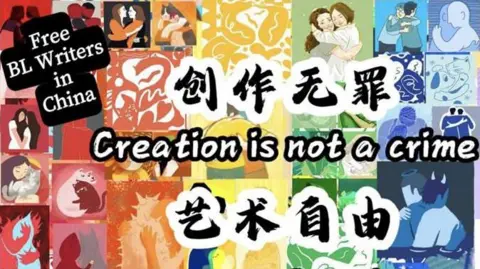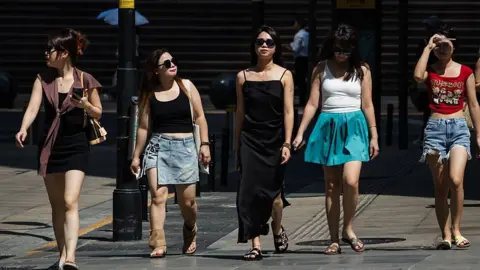

China is cracking down on young women who write gay erotica
At least 30 writers have been arrested across the country since February, a lawyer tells the BBC.
'Every word has come back to haunt me': China cracks down on women who write gay erotica
1 day agoYi Ma
BBC News
Reporting fromLondon
Eunice Yang
BBC Chinese
Reporting fromHong Kong

Several women say they have been arrested for writing gay erotica, or "danmei"
"I've been warned not to talk about it," the woman wrote, before revealing snippets of the day she says she was arrested for publishing gay erotica.
"I'll never forget it - being escorted to the car in full view, enduring the humiliation of stripping naked for examination in front of strangers, putting on a vest for photos, sitting in the chair, shaking with fear, my heart pounding.”

The handle, Pingping Anan Yongfu, is among at least eight in recent months which have shared accounts on Chinese social media platform Weibo of being arrested for publishing gay erotic fiction.
 As authors recounted their experiences, dozens of lawyers offered pro bono help.
As authors recounted their experiences, dozens of lawyers offered pro bono help.At least 30 writers, nearly all of them women in their 20s, have been arrested across the country since February, a lawyer defending one told the BBC. Many are out on bail or awaiting trial, but some are still in custody. Another lawyer told the BBC that many more contributors were summoned for questioning.
They had published their work on Haitang Literature City, a Taiwan-hosted platform known for its "danmei", the genre of so-called boys' love and erotic fiction.
Think of it as a gay version of Fifty Shades of Grey: a BDSM relationship that leads to a happily-ever-after.
 That's a frequent trope, across historical, fantasy or sci-fi settings. Over the years it has cultivated a fiercely devoted following, especially among young Chinese women.
That's a frequent trope, across historical, fantasy or sci-fi settings. Over the years it has cultivated a fiercely devoted following, especially among young Chinese women.These authors are being accused of breaking China's pornography law for "producing and distributing obscene material". Writers who earn a profit could be jailed for more than 10 years.

The law targets "explicit descriptions of gay sex or other sexual perversions".
 Heterosexual depictions often have more leeway
Heterosexual depictions often have more leeway  - works by acclaimed Chinese authors, including Nobel Laureate Mo Yan, have graphic sexual scenes, but are widely available.
- works by acclaimed Chinese authors, including Nobel Laureate Mo Yan, have graphic sexual scenes, but are widely available.
The crackdown has sparked support from the danmei community online
Although authors of heterosexual erotica have been jailed in China, observers say the genre is subjected to far less censorship. Gay erotica, which is more subversive, seems to bother authorities more. Volunteers in a support group for the Haitang writers told the BBC police even questioned some readers.
Those who reported being arrested declined to be interviewed, fearing repercussions. Police in the northwestern city of Lanzhou, who are accused of driving this crackdown, have not responded to the BBC.
Online, the crackdown has unleashed a debate - and a rarer pushback against the law.
"Is sex really something to be ashamed of?" a Weibo user asked, arguing that China's anti-obscenity laws are out of touch. Another wrote that women never get to decide what is obscene because they don't control the narrative. Even legal scholars have expressed concern that just 5,000 views for anything deemed "obscene" qualifies as criminal "distribution", lowering the bar to arrest creators.
It made Beijing uneasy enough that discussions have been vanishing: #HaitangAuthorsArrested drew more than 30 million views on Weibo before it was censored. Posts offering legal advice are gone. A prominent Chinese news site's story has been taken down. Writers' accounts, and some of the handles, are also disappearing.
After Pingping Anan Yongfu's post went viral, she deleted it and wrote another, thanking supporters and admitting her writing had violated the law. She then deleted her handle.
Before that last post, she had written: "I was always the good girl in my parents' eyes. But that day, I brought them nothing but shame. They'll never hold their heads up again."
Danmei: The uncrowned royal of pop culture
These women have long worked in the shadows in China, where homosexuality and eroticism are stigmatised. Now outed by police investigations, they face social consequences that are as brutal as the legal ones.

Chinese gay erotica is inspired by Japanese boys' love manga


 and are at ease with being vulnerable
and are at ease with being vulnerable 

 Dr Ge says.
Dr Ge says.




